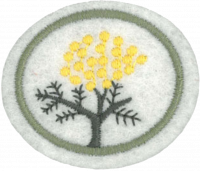Difference between revisions of "AY Honors/Wattles/Requirements"
(Marked this version for translation) |
m |
||
| Line 4: | Line 4: | ||
<b>1. <section begin=req1 /><noinclude><translate><!--T:1--> | <b>1. <section begin=req1 /><noinclude><translate><!--T:1--> | ||
| − | </noinclude>What is the approximate number of named varieties of wattles in Australia? | + | </noinclude>What is the approximate number of named varieties of wattles in Australia? |
<noinclude></translate></noinclude><section end=req1 /></b> | <noinclude></translate></noinclude><section end=req1 /></b> | ||
Revision as of 17:43, 23 April 2021
1. What is the approximate number of named varieties of wattles in Australia?
2. a. What are phyllodes?
- b. What work do they do for the plant?
- c. Why are phyllodes so important in the study of acacias?
3. How are acacias classified into two major groups?
4. How does the shape of the seed pod and the way the seeds lie in the pod help in identification?
5. How many acacias in your state have true leaves (bipinnate) when adults?
6. a. In seeding acacias what is seen first, true leaves or phyllodes?
6 b. How many have true leaves?
7. What must happen to an acacia seed before it will germinate and grow?
8. What acacias phyllodes are used to feed stock in times of drought?
9. What is the bark of some acacias used for in Australia?
10. What species of acacias are used for furniture making?
11. How do acacias help and benefit man, animals, insects, birds?
20 or more close-up photographs you have taken of wattles showing the above details.


